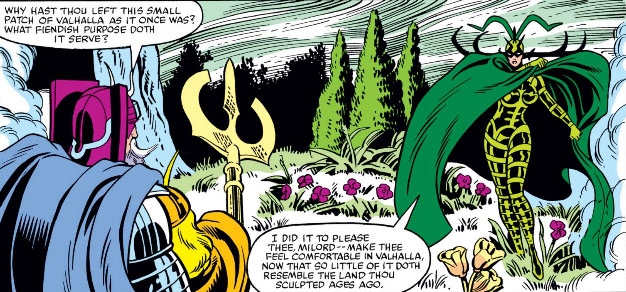Monday, January 8, 2018
Once More, Valhalla!
In reviewing the story of Harokin the Barbarian, we were obliged to also begin taking a closer look at Valhalla, the glistening realm where those Asgardians who perished in battle were taken by Odin's "choosers of the slain," the Valkyries, to spend eternity in the joyous pursuit of armed conflict. It was a plane of existence where Hela, the Goddess of Death, was forbidden to enter; but over a period of time, Hela began annexing Valhalla to her own domain, the dread Dimension of Death. As a result, the Einherjar, those chosen legions who populate Valhalla, found themselves forming an allegiance to Hela--with Harokin, their leader, eventually acknowledging Hela as their queen.
We've seen how Harokin finally reached the point where he stepped up and redeemed himself in the eyes of himself and the Asgardians--but during the time Hela's domain and that of Valhalla were as one, Harokin's blind loyalty was to Hela and Hela alone, and that Harokin resembled more the ruthless warrior who led hordes of barbarians against Asgardian territories in search of plunder and power. Consequently, Harokin was solidly in Hela's camp by the time Odin was resolved to restore Valhalla to its former glory and deal with the one who usurped it.
Odin's wake-up call on the situation comes when Balder the Brave returns from an unfortunate encounter with the Queen of the Norns, Karnilla--one which resulted in the death of his beloved, Nanna, who now must spend eternity in a bleak and foreboding land that no longer embraces and fulfills the spirit of all Asgardians.
Odin's first step is to reassemble his Valkyries to act as his advance strike force in the coming mission. But a sign of the struggle that awaits them becomes apparent when the Valkyries are forced to battle demons of fire just to gain entry to their destination. On the verge of being overwhelmed by beings they cannot directly harm, they finally devise a tactic that deals with their foes--but once they've arrived, they're startled to find that the very same warriors they delivered to Valhalla ages past have now become their enemies, with Harokin himself leading the charge.
The Valkyries give as good as they get, and then some. But vastly outnumbered, the battle soon goes against them--and unlike their foes, they're the only ones engaged in this war who are vulnerable to death.
It's clear that the Valkyries will go down to the last of their number fighting--but in a gruesome and twisted move, Harokin sends those Valkyries who have just met their deaths against those who still live, which brings their desperate battle to an end.
By the time Odin arrives on the scene, only the slain Valkyries remain as evidence of his intent to re-take Valhalla. As one who has seen his share of war and commanded Asgard's legions throughout his immortal life, Odin has arguably waged a poorly thought-out campaign. How were boasts and swords meant to deal with those who populate a realm of the dead--to say nothing of the personification of death itself? And if confronting and defeating Hela is the key to victory, and Odin meaning to do just that, why send in the Valkyries at all? It's understandable if they were reassembled after the fact, with Valhalla back in operation and once more depending on the Valkyries to sustain it--but what was their function here and now? Softening up the opposition? Exactly how were they equipped to do that?
And so Odin's fortunes in this endeavor have been quickly reversed--and Hela herself stands ready to bring the encounter to an end.
But the stage is set for more than the quick denouement that Hela expects. Incredibly, it's Odin who behaves as if his prevailing in this conflict is a foregone conclusion. If the Einherjar had remained on the scene, that might be in doubt; but since they've conveniently been ejected from the story, this Tales Of Asgard fable has been fast-tracked to cut to the chase and skip directly to the main event. And since Odin has been shown quite able to decisively deal with Hela, there's really no doubt to the contrary--except from Hela, herself.
The battle over, it only remains for Odin to discover the reason for Hela's actions. In previous stories, Hela's habit of taking her duties too far has always sufficed for her motivations; yet this time, it's her very existence that's at the root of her frustration, an existence that offers no way out, and no turning from the path she is on. It's a cold realization that she must face--but there is none colder who is better suited to do so.
We're not privy to whatever Odin shared with Hela as far as enlightenment--but regardless, the conflict is ended, and Odin's mission accomplished, with even his Valkyries none the worse for wear. The only unresolved part of the story is how the Einharjar are reacting to their "queen" being deposed--but a a healthy supply of ale and a few battles in the light of day instead of the gloom of shadows and mist should have them returning to their carousing selves in no time.













No comments:
Post a Comment